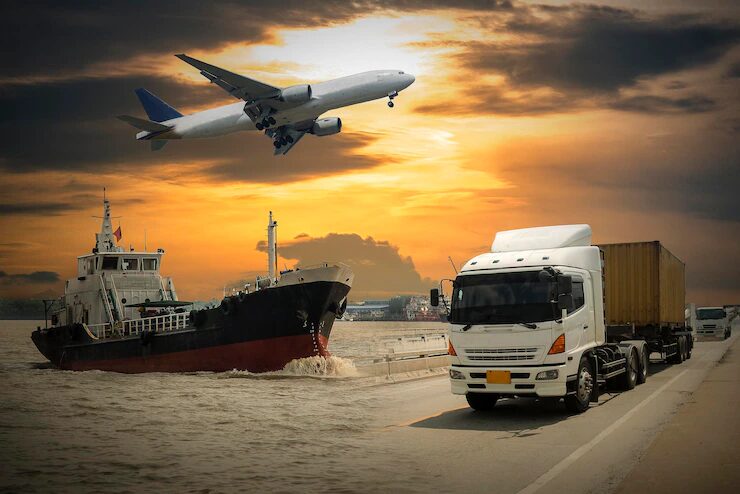Freight forwarding Service is a process of arranging the transportation of goods from one place to another, usually across international borders. A freight forwarder is a company or an individual that acts as an intermediary between the shipper and the carrier, and handles the logistics, documentation, and customs clearance of the shipment.
What is the role of a freight forwarder?

A freight forwarder performs various tasks to ensure the smooth and timely delivery of the goods, such as:
- Consulting: A freight forwarder can advise the shipper on the best mode of transportation, routing, cost, and delivery time for their shipment. They can also help the shipper with the packaging, labeling, and insurance of the goods.
- Booking: A freight forwarder can book the space and capacity on the carrier’s vessel, truck, plane, or train, and negotiate the rates and terms of the contract.
- Documentation: A freight forwarder can prepare and submit the necessary documents for the shipment, such as the bill of lading, commercial invoice, packing list, certificate of origin, and export declaration. They can also obtain the required permits and licenses for the shipment.
- Customs clearance: A freight forwarder can handle the customs formalities and duties for the shipment, and ensure the compliance with the regulations of the origin and destination countries.
- Tracking: A freight forwarder can monitor the status and location of the shipment, and provide the shipper with updates and alerts. They can also handle any issues or delays that may arise during the transportation.
- Delivery: A freight forwarder can arrange the final delivery of the goods to the consignee, and provide the proof of delivery.
What are the benefits of using a freight forwarding service?

Using a freight forwarding service can offer several advantages for the shipper, such as:
- Convenience: A freight forwarder can save the shipper time and hassle by taking care of the entire transportation process, from booking to delivery. The shipper only needs to provide the details of the goods and the destination, and the freight forwarder will handle the rest.
- Expertise: A freight forwarder can leverage their knowledge and experience in the industry to provide the best solutions for the shipper. They can handle the complex and changing regulations, tariffs, and procedures of different countries, and avoid any potential risks or penalties.
- Flexibility: A freight forwarder can offer a variety of options and alternatives for the shipper, depending on their needs and preferences. They can choose the most suitable mode of transportation, carrier, route, and transit time for the shipment, and adjust them if necessary.
- Cost-effectiveness: A freight forwarder can reduce the cost of the shipment by negotiating the best rates and terms with the carriers, and taking advantage of their economies of scale and network of partners. They can also help the shipper optimize the packaging, weight, and volume of the goods, and minimize the taxes and duties.
How to choose the right freight forwarder?
Choosing the right freight forwarder is crucial for the success of the shipment. The shipper should consider the following factors when selecting a freight forwarder:
- Reputation: The shipper should check the reputation and credibility of the freight forwarder, by looking at their reviews, ratings, testimonials, and references. They should also verify their credentials, certifications, and memberships in relevant associations and organizations.
- Experience: The shipper should look for a freight forwarder that has experience and expertise in handling the type, quantity, and destination of the goods. They should also ask about their track record, success rate, and case studies of similar shipments.
- Services: The shipper should compare the services and features offered by different freight forwarders, and choose the one that meets their requirements and expectations. They should also inquire about the availability, accessibility, and responsiveness of the freight forwarder, and their communication and reporting methods.
- Rates: The shipper should request and compare the quotes and contracts from different freight forwarders, and choose the one that offers the best value for money. They should also be aware of the hidden fees, surcharges, and extra costs that may be involved in the shipment.
What are the different modes of transportation in freight forwarding?

There are four main modes of transportation in freight forwarding, each with its own advantages and disadvantages:
- Sea freight: Sea freight is the most common and economical mode of transportation for large and heavy shipments, especially for long distances. However, it is also the slowest and most unpredictable mode, as it is subject to weather conditions, port congestion, and customs delays.
- Air freight: Air freight is the fastest and most reliable mode of transportation for urgent and perishable shipments, especially for short distances. However, it is also the most expensive and restrictive mode, as it is subject to weight and size limitations, security checks, and fuel surcharges.
- Road freight: Road freight is the most flexible and accessible mode of transportation for domestic and regional shipments, as it can reach any location that has a road network. However, it is also the most vulnerable and risky mode, as it is subject to traffic conditions, accidents, and theft.
- Rail freight: Rail freight is the most environmentally friendly and stable mode of transportation for bulky and heavy shipments, especially for long distances. However, it is also the most inflexible and dependent mode, as it requires a fixed rail network and intermodal transfers.
What are the documentation and customs clearance in freight forwarding?

Documentation and customs clearance are two of the most important and challenging aspects of freight forwarding, as they involve the compliance with the laws and regulations of different countries. The shipper and the freight forwarder should work together to ensure the accuracy and completeness of the documents and the customs formalities, and avoid any errors, delays, or penalties.
Some of the common documents required for freight forwarding are:
- Bill of lading: A bill of lading is a document issued by the carrier that serves as a receipt, a contract, and a proof of ownership of the goods. It contains the details of the shipper, the consignee, the carrier, the goods, and the terms and conditions of the transportation.
- Commercial invoice: A commercial invoice is a document issued by the shipper that serves as a bill, a declaration, and a proof of value of the goods. It contains the details of the shipper, the consignee, the goods, the price, the currency, and the payment terms.
- Packing list: A packing list is a document issued by the shipper that serves as a checklist, a guide, and a proof of quantity of the goods. It contains the details of the shipper, the consignee, the goods, the weight, the volume, the packaging, and the marks and numbers.
- Certificate of origin: A certificate of origin is a document issued by the exporter or a chamber of commerce that serves as a verification, a qualification, and a proof of origin of the goods. It contains the details of the exporter, the importer, the goods, and the country of origin.
- Export declaration: An export declaration is a document issued by the shipper or the freight forwarder that serves as a notification, a registration, and a proof of export of the goods. It contains the details of the shipper, the consignee, the goods, the value, the destination, and the mode of transportation.
Some of the common customs clearance procedures for freight forwarding service are:
- Classification: Classification is the process of assigning a code to the goods, based on the Harmonized System (HS) or the Tariff Schedule of the destination country. The code determines the applicable duties, taxes, and regulations for the goods.
- Valuation: Valuation is the process of determining the value of the goods, based on the transaction value or the alternative methods of the destination country. The value determines the amount of duties and taxes to be paid for the goods.
- Duty payment: Duty payment is the process of paying the duties and taxes for the goods, based on the classification and valuation of the goods. The payment can be made by the shipper, the consignee, or the freight forwarder, depending on the terms of the contract.
- Inspection: Inspection is the process of checking the goods, the documents, and the packaging, by the customs authorities of the destination country. The inspection can be random or selective, and it can be done at the origin, the transit, or the destination.
- Release: Release is the process of obtaining the permission and the clearance from the customs authorities of the destination country, to deliver the goods to the consignee. The release can be conditional or unconditional, and it can be done electronically or manually.
What are the tips for successful freight forwarding?

Freight forwarding can be a complex and daunting process, but it can also be a rewarding and satisfying experience. Here are some tips for successful freight forwarding:
- Plan ahead: The shipper should plan ahead and prepare the shipment well in advance, to avoid any rush, stress, or mistakes. They should also consider the factors that may affect the shipment, such as the season, the holidays, the weather, and the political situation.
- Choose wisely: The shipper should choose wisely and carefully the freight forwarder, the mode of transportation, the carrier, and the route, to ensure the best service, quality, and price for the shipment. They should also compare and contrast the options and alternatives, and ask for recommendations and referrals.
- Communicate effectively: The shipper should communicate effectively and frequently with the freight forwarder, the carrier, and the consignee, to ensure the smooth and timely delivery of the goods. They should also provide and update the accurate and complete information and documents for the shipment, and report and resolve any issues or problems that may arise.
- Pack properly: The shipper should pack properly and securely the goods, to protect them from any damage, loss, or theft during the transportation. They should also follow the standards and regulations of the origin and destination countries, and the carrier’s requirements, for the packaging, labeling, and marking of the goods.
- Insure adequately: The shipper should insure adequately and appropriately the goods, to cover them from any risk or liability that may occur during the transportation. They should also understand the terms and conditions of the insurance policy, and the claims and compensation process.
- Freight forwarding is a vital and valuable service for the global trade and commerce. By following these tips and guidelines, the shipper can make the most of the freight forwarding service, and enjoy the benefits of a fast, safe, and cost-effective transportation of their goods.




